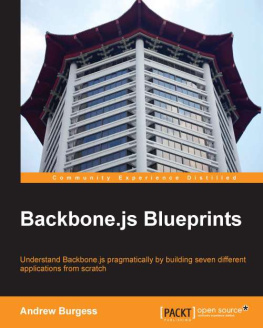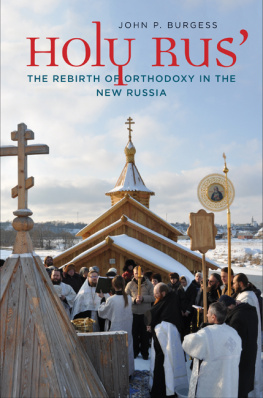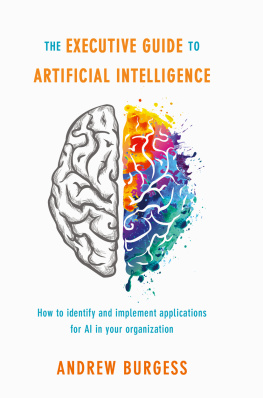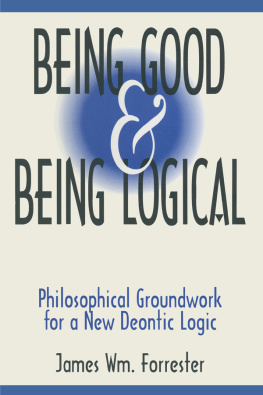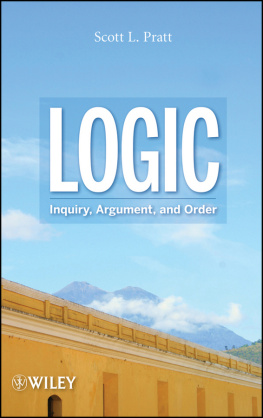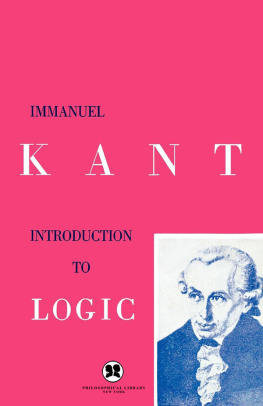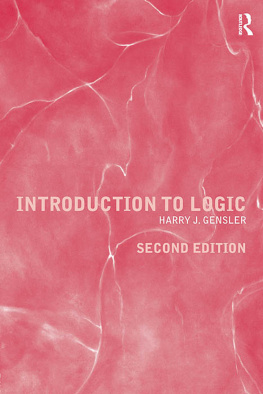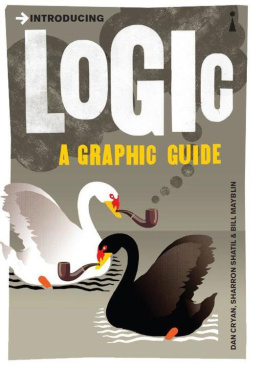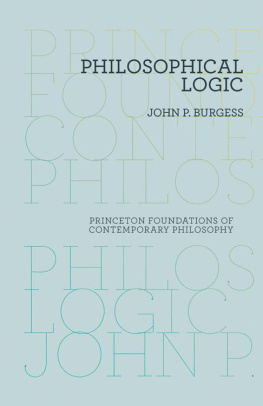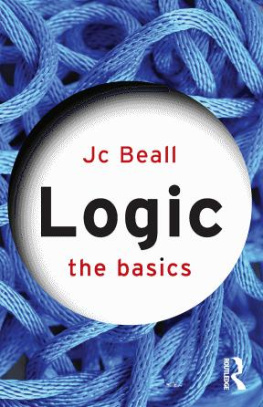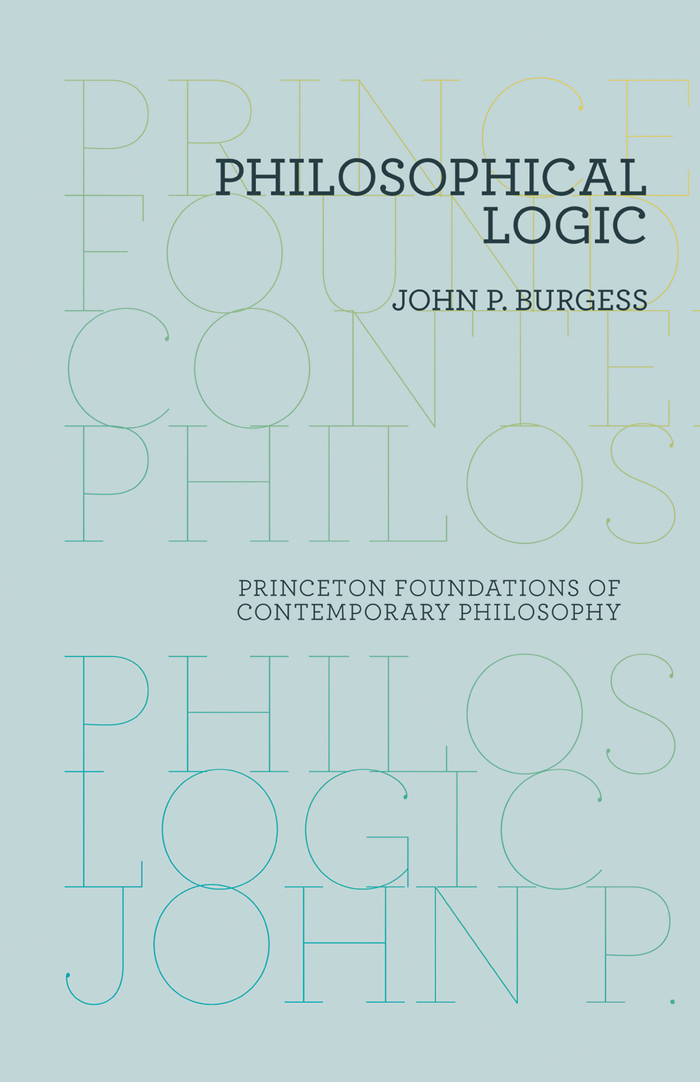Philosophical Logic
PRINCETON FOUNDATIONS OF CONTEMPORARY PHILOSOPHY
Scott Soames, Series Editor
Philosophical Logic by JOHN P. BURGESS
Philosophy of Language by SCOTT SOAMES
Philosophy of Law by ANDREI MARMOR
Truth by JOHN P. BURGESS and ALEXIS G. BURGESS
PHILOSOPHICAL
LOGIC
John P. Burgess
PRINCETON UNIVERSITY PRESS
PRINCETON AND OXFORD
Copyright 2009 by Princeton University Press
Published by Princeton University Press,
41 William Street, Princeton, New Jersey 08540
In the United Kingdom: Princeton University Press,
6 Oxford Street, Woodstock, Oxfordshire OX20 1TW
press.princeton.edu
All Rights Reserved
Fourth printing and first paperback printing, 2012
Paperback ISBN 978-0-691-15633-0
The Library of Congress has cataloged the cloth edition of this book as follows
Burgess, John P., 1948
Philosophical logic / John P. Burgess.
p. cm. (Princeton foundations of contemporary philosophy)
Includes bibliographical references and index.
ISBN 978-0-691-13789-6 (hardcover : alk. paper)
1. Logic. I. Title.
BC71.B89 2009 160dc22 2008050131
British Library Cataloging-in-Publication Data is available
This book has been composed in Archer and Minion Pro
Printed on acid-free paper.
Printed in the United States of America
10 9 8 7 6 5 4
Contents
Preface
PHILOSOPHICAL LOGIC, in one of several senses of the term, is just the part of logic dealing with proposed extensions of or alternatives to classical logic. The aim of this book is to provide a foundation in philosophical logic in this sense, sufficient to equip the reader to follow basic applications in analytic philosophy, and to tackle if desired more advanced works. There can be no question of encyclopedic coverage, but the branches selected for treatmentwhat they are can be seen from the table of contentsare ones generally agreed to be central and important.
Volumes in this series are intended to provide short introductions to various fields of philosophy, and both the limitations of length and the orientation towards philosophically rather than technically minded readers have been taken seriously here. Limitations of space have enforced concision. Some previous acquaintance with logic has to be presupposed, though only as much as would be supplied by any good introductory textbook, and even of that a rapid review is undertaken in the first chapter. Some proofs are omittedor as is said, making a virtue of necessity, are left to the reader as exercises. Again for reasons of space, these are the only exercises: there are no end-of-chapter problem sets. More problems may be found, however, at http://press.princeton.edu/titles/9037.html.
Bibliography and history, either one of which could easily fill a volume twice the size of this one, are given limited space. There are suggestions for further readings at the ends of chapters. These include works of my own where certain topics are more fully treated, but special care has been taken to direct the reader to sources of second opinions in the case of those anti-classical logics with which I am not in sympathy (not that anyone could sympathize with all of them). As for history, the negative point goes almost without saying, that in an expository work like this the ideas presented are with few exceptions not original with the expositor. Positive attempts to trace the history of the subject do not go beyond unsystematic remarks and the usual device of attachment of personal names to various items of interest (Adams criterion, Barcan formula).
Any work on the present topic, and especially any short work, will have to draw a balance between philosophical and technical aspects of the field, and no way of balancing the two will please everyone. On the one hand, philosophical topics, such as the metaphysics of modality, that are connected with but not centrally part of logic, and that are slated for treatment in other volumes of this series, will be treated only briefly here. So, too, will be issues of philosophy of logic, which is no more to be confused with philosophical logic than is history of geology with historical geology. Philosophical logic is a branch of logic, a technical subject, and there is no need to apologize if this book is more technical in character than others in the series in which it appears.
On the other hand, the reader more interested in an overview than an immersion in the subject can simply skip or defer reading technical proofs, which are set off from the main text, thus extracting an even shorter book from this already short book. Above all the temptation to include topics of great technical interest but doubtful philosophical relevance has been resisted. The center of gravity of philosophical logic today lies in theoretical computer science, but not the center of gravity of this book, which is written with the needs in mind of students of philosophy and philosophers who are not specialists in logic. Among the more technically oriented a logic no longer means a theory about which forms of argument are valid, but rather means any formalism, regardless of its intended applications, that resembles a logic in this original sense enough to allow it to be usefully studied by similar methods. In this book I unashamedly take seriously philosophical questions of logic in the original sense (such as the question which modal system gives the right account of the formal logic of modal notions, or whether relevantists were right in claiming certain classical forms of argument invalid) in a way the more technically oriented would regard as reactionary or quaint.
Acknowledgments
MY PERSONAL DEBTS go far beyond the published literature cited in the references at the end of the volume. My first teacher of logic, the late Ivo Thomas, introduced me to the lore of temporal and modal logic, much of it at the time unpublished, almost before he taught me classical predicate logic. Colleagues, especially the late David Lewis, were over the years frequent sources of information and insights. Generations of students in my seminar Heresies in Logic have presented me with an opportunity to try out various approaches, and have caught errors in early drafts of material eventually adapted for incorporation into this book. To all these persons I am most grateful, as well as to Scott Soames for the invitation to contribute a volume to the present series. Stewart Shapiro and Kit Fine carefully read the whole manuscript, leading to many improvements. It was a pleasure to work again with Ian Malcolm and Jodi Beder, and also with Sara Lerner, in the production of this volume.
Philosophical Logic
CHAPTER ONE
Classical Logic
1.1 EXTRA-CLASSICAL LOGICS
What is philosophical logic? For the reader who has some acquaintance with classical or textbook logicas it is assumed that readers here dothe question admits an easy answer. Philosophical logic as understood here is the part of logic dealing with what classical leaves out, or allegedly gets wrong.
Classical logic was originally created for the purpose of analyzing mathematical arguments. It has a vastly greater range than the traditional syllogistic logic it displaced, but still there are topics of great philosophical interest that classical logic neglects because they are not important in mathematics. In mathematics the facts never were and never will be, nor could they have been, other than as they are. Accordingly, classical logic generally neglects the distinctions of past and present and future, or of necessary and actual and possible.


